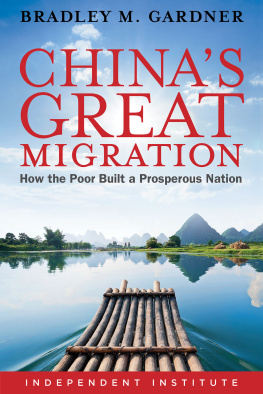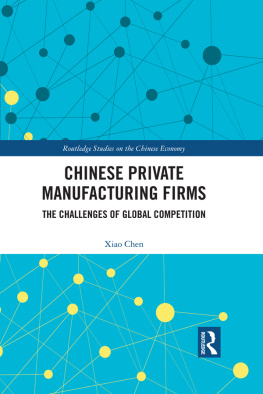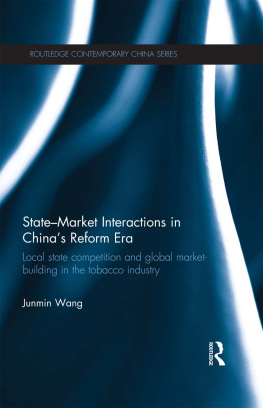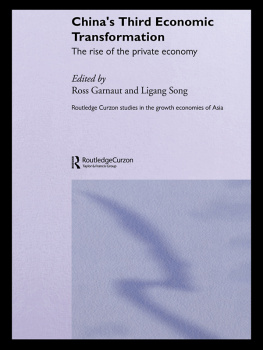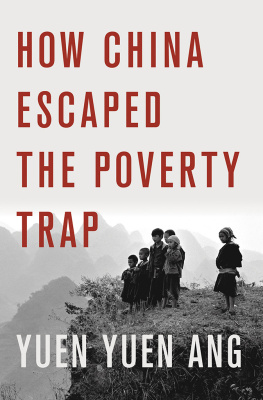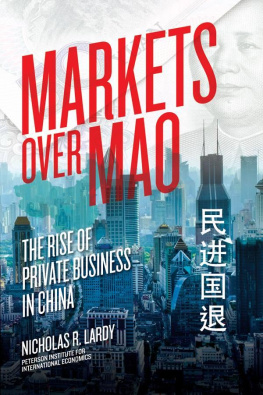Figures
A multilevel model of institutional change
Scenario I: Dominance of formal rules
Scenario II: Inefficient and nonenforced state-mandated rules
Scenario III: Institutional change from below
Private firm development, 19892007
Interprovincial distribution of private-sector activities in 2004
Private firm registration in the Yangzi delta, 19801993
Private firm registration in the Yangzi delta, 19932008
The seven survey cities
Ownership type of largest input supplier
Spatial distribution of suppliers
Ownership structure of customers
Spatial distribution of sales structure
Average annual wages in manufacturing sector by ownership and city, 2005
Frequency of labor disputes, 2003
Cause of labor disputes, 2003
Provincial markets for technology and patenting, 19952006
Technology cooperation and firm innovativeness
Fiscal revenue and private firm employment in the Yangzi delta region
State-owned enterprise production and tax income, 19782009
Party membership of founders
Tables
Socioeconomic conditions in the seven survey cities, 2006
Provincial contribution to national gross industrial output by sector, 2006
Firm sample by city, sector, and firm size, 2006 wave
Legal form of private companies
Implementation of legally required organizational bodies
Shareholders in management positions, by corporate form
Authority index of shareholder meeting and board of directors, by corporate form
Decoupling and company performance
Recruitment channels, 2009
Formal recruitment and labor turnover, 20032005
Average annual wage, 2005
Decision to offer employee insurance, 2005
Labor disputes, 19962007
Contract type and job category
Timing of standardization of employment relations
Market recruitment, governance, and turnover
Firm innovation from 2002 to 2009
Top sources of new ideas
Sample mean comparison tests for top sources of innovation ideas and different types of innovation, 2009
Sample mean comparison tests for informal collaboration and different types of innovation, 2009
Formal research agreements of innovating firms in 2009
Sample mean comparison tests for formal collaboration and different types of innovation, 2009
Technical cooperation and innovativeness
Ownership, technology exchange, and innovation
Political capital, networking, and success in regulated markets
Political capital and firm size
Political capital and profitability
Political capital, rent seeking, and company performance in China, 2002
A quest to explain institutional change that gave rise to a new economic order is complex and challenging. This book reports the results of a six-year (20052011) study that aims to do just that. The effort has had many moving parts, involving contributions of an international research team. Our intellectual debts are deep and extensive. Here we wish to thank the researchers, scholars, and staff who contributed to our study over the course of those years. David Su, Lu Hanlong, and researchers at the Institute of Sociology of the Shanghai Academy of Social Sciences shared with us their expertise and advice every step of the way. Without the dedication and efforts of Sun Bocheng and his entire staff at the Market Survey Research Institute, our firm-level surveys in the Yangzi delta region could not have been carried out. Colleagues in China helped us significantly: Shi Jinchuan, Justin Yifu Lin, Victor Yuan, Guo Li, and Lu Hanyin.
The John Templeton Foundation provided major funding for the project. We thank especially Barnaby Marsh, who took an interest in the projects aims from inception to completion. We are also appreciative of the support of the Swedish Research Council, the College of Arts and Sciences at Cornell University, Tetra Pak Corporation, and the Crafoord Foundation for funding the research.
We thank Michael Aronson, our editor at Harvard University Press, for his support and editorial input at each stage. Rachel Davis provided outstanding editing of the manuscripts, which clarified our arguments. Thanks also to Barbara Goodhouse, our production editor.
We gratefully acknowledge the help of graduate research assistants in the Department of Sociology at Cornell: Yujun Wang, Ningxi Zhang, and Zun Tang, as well as Christopher Yenkey, Li Ma, Mark Jacobs, and Paul Lee.
Many colleagues read the entire manuscript and contributed detailed comments and criticism: William Parish, Michael Macy, Walter Powell, Benjamin Cornwell, Lisa Keister, and Frank Young. Other scholars who commented on parts of the manuscript include Howard Aldrich, Fredrik Andersson, Wm. Theodore de Bary, Matthew Bothner, Susan Buck-Morss, Ronald Burt, Franco Cerase, Robert Ellickson, Joseph Galaskiewicz, Christer Gunnarsson, Ravi Ramamurti, Eric Siggia, Ivn Szelnyi, and Markus Taube. Glenn Carroll, Michael Hannan, Douglas Heckathorn, Hkan Holm, Jesper Srensen, David Strang, Richard Swedberg, Anne Tsui, and Rafael Wittek contributed useful counsel at various stages.
Sonja Opper acknowledges the generous support of the Department of Economics at Lund University, which granted a teaching-free year (2009) to support research and writing at a critical stage. She also appreciates the lively and valuable discussions at seminars organized at Lund University (2010), Cornell University (2007, 2011), Fudan University (2007, 2010), the University of Duisburg-Essen (2008, 2010), Erasmus University of Rotterdam (2009), and the University of Trier (2008). Furthermore, she is grateful for valuable comments received from conference participants at the Annual Meeting of the International Society of New Institutional Economics (2011), the Conference on Endogenous Institutional Change at Lund University (2011), the Annual Meeting of the International Academy of Chinese Management Research (2010), the Annual Meeting of the Academy of Management (2008), and the Annual Meeting of the European Economic Association (2008). Over the years, student feedback also provided a constant stream of ideas. Most importantly, participants in the graduate courses on Chinas Economy at Lund University were among the first to listen to our argument and to discuss some of the key ideas developed in this book. Finally, friends and family provided invaluable support. In particular, Sonja thanks Bjrn Meyer for many fruitful discussions, for insightful remarks on part of the manuscript, and for his steadfast support and encouragement.


